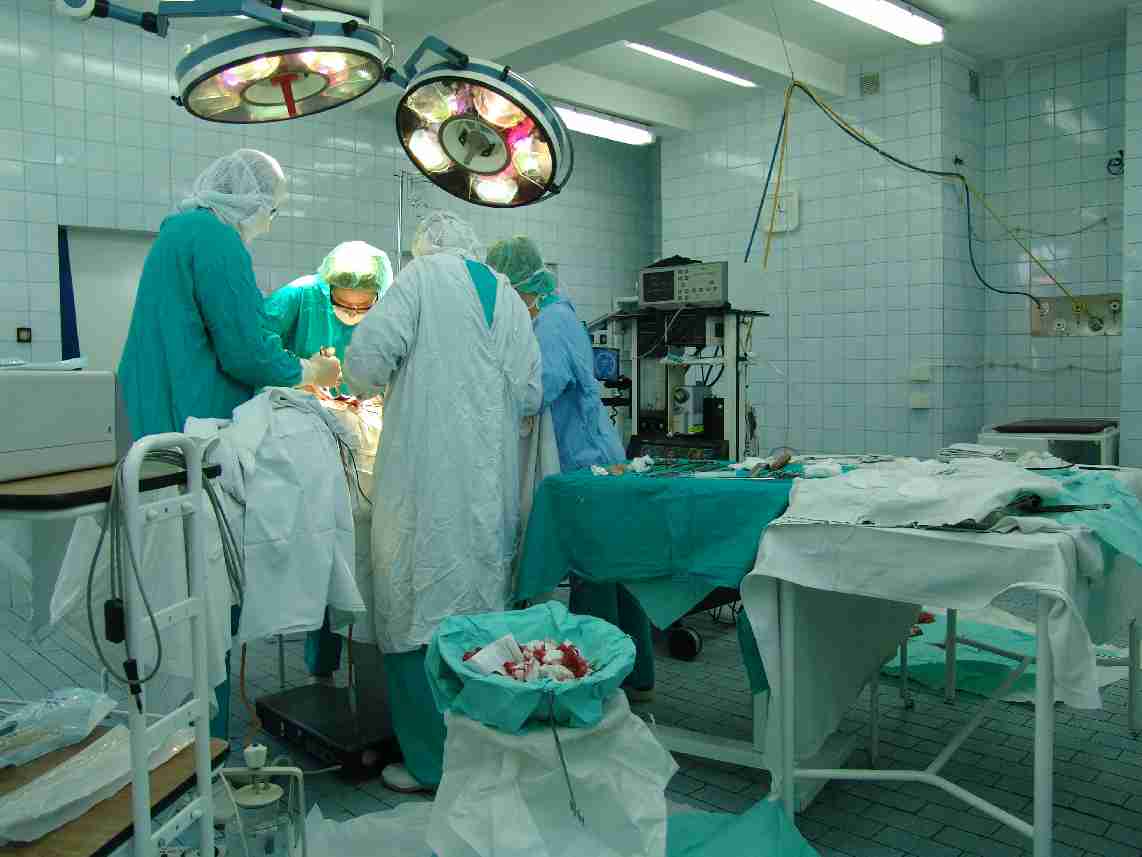|
Madzikane KaZulu Hospital
Madzikane Ka Zulu Memorial Hospital is a Provincial government funded hospital in Mount Frere in the Alfred Nzo District of the Eastern Cape province of South Africa. It is situated just a few kilometres north of Mount Frere town on the N2 road. It is a landmark in the area, being one of the largest hospitals in the province. The hospital departments include Emergency department, Paediatric ward, Gynecology and Maternity ward, Out Patients Department (OPD), Surgical Services, Medical Services, Operating Theatre & CSSD Services, Laboratory, Pharmacy, Anti-Retroviral (ARV) treatment for HIV/AIDS, Post Trauma Counselling Services, Termination of Pregnancy Services, X-ray Services, Physiotherapy, Occupational Health Services, Laundry, Kitchen Services and Mortuary A morgue or mortuary (in a hospital or elsewhere) is a place used for the storage of human corpses awaiting identification (ID), removal for autopsy, respectful burial, cremation or other methods of disposa ... [...More Info...] [...Related Items...] OR: [Wikipedia] [Google] [Baidu] |
Mount Frere
Mount Frere, officially KwaBhaca, is a town located in the Eastern Cape province, previously known as the Transkei region, of South Africa. Its name in Xhosa is KwaBhaca, or "village of the Bhaca chiefdom", or "place of the Bhaca people", who settled here around the year 1825. KwaBhaca is situated between Kokstad and Mthatha along the N2 road about 100 km north east of Mthatha. It is administered by the Alfred Nzo District Municipality and the villages are ruled by the Tribal chief with intermediary borders. Mount Frere was founded in the 17th century and named after Sir Henry Bartle Edward Frere Sir Henry Bartle Edward Frere, 1st Baronet, (29 March 1815 – 29 May 1884) was a Welsh British colonial The British Empire was composed of the dominions, colonies, protectorates, mandates, and other territories ruled or administered b .... In February 2016, Mount Frere was renamed KwaBhaca. References External linksBhaca, AmaBhaca Populated places in the Umzimv ... [...More Info...] [...Related Items...] OR: [Wikipedia] [Google] [Baidu] |
Operating Theatre
An operating theater (also known as an operating room (OR), operating suite, or operation suite) is a facility within a hospital where surgical operations are carried out in an aseptic environment. Historically, the term "operating theater" referred to a non-sterile, tiered theater or amphitheater in which students and other spectators could watch surgeons perform surgery. Contemporary operating rooms are usually devoid of a theater setting, making the term "operating theater" a misnomer in those cases. Operating rooms Operating rooms are spacious, in a cleanroom, and well-lit, typically with overhead surgical lights, and may have viewing screens and monitors. Operating rooms are generally windowless, though windows are becoming more prevalent in newly built theaters to provide clinical teams with natural light, and feature controlled temperature and humidity. Special air handlers filter the air and maintain a slightly elevated pressure. Electricity support has backup systems in ... [...More Info...] [...Related Items...] OR: [Wikipedia] [Google] [Baidu] |
Mortuary
A morgue or mortuary (in a hospital or elsewhere) is a place used for the storage of human corpses awaiting identification (ID), removal for autopsy, respectful burial, cremation or other methods of disposal. In modern times, corpses have customarily been refrigerated to delay decomposition. Etymology and lexicology The term ''mortuary'' dates from the early 14th century, from Anglo-French ''mortuarie'', meaning "gift to a parish priest from a deceased parishioner," from Medieval Latin mortuarium, noun use of neuter of Late Latin adjective mortuarius "pertaining to the dead," from Latin ''mortuus'', pp. of ''mori'' "to die" (see mortal (adj.)). The meaning of "place where the deceased are kept temporarily" was first recorded in 1865, as a euphemism for the earlier English term "deadhouse". The term ''morgue'' comes from the French. First used to describe the inner wicket of a prison, where new prisoners were kept so that jailers and turnkeys could recognize them in the futu ... [...More Info...] [...Related Items...] OR: [Wikipedia] [Google] [Baidu] |
Kitchen
A kitchen is a room or part of a room used for cooking and food preparation in a dwelling or in a commercial establishment. A modern middle-class residential kitchen is typically equipped with a stove, a sink with hot and cold running water, a refrigerator, and worktops and kitchen cabinets arranged according to a modular design. Many households have a microwave oven, a dishwasher, and other electric appliances. The main functions of a kitchen are to store, prepare and cook food (and to complete related tasks such as dishwashing). The room or area may also be used for dining (or small meals such as breakfast), entertaining and laundry. The design and construction of kitchens is a huge market all over the world. Commercial kitchens are found in restaurants, cafeterias, hotels, hospitals, educational and workplace facilities, army barracks, and similar establishments. These kitchens are generally larger and equipped with bigger and more heavy-duty equipment than ... [...More Info...] [...Related Items...] OR: [Wikipedia] [Google] [Baidu] |
Laundry
Laundry refers to the washing of clothing and other textiles, and, more broadly, their drying and ironing as well. Laundry has been part of history since humans began to wear clothes, so the methods by which different cultures have dealt with this universal human need are of interest to several branches of scholarship. Laundry work has traditionally been highly gendered, with the responsibility in most cultures falling to women (formerly known as laundresses or washerwomen). The Industrial Revolution gradually led to mechanized solutions to laundry work, notably the washing machine and later the tumble dryer. Laundry, like cooking and child care, is still done both at home and by commercial establishments outside the home. The word "laundry" may refer to the clothing itself, or to the place where the cleaning happens. An individual home may have a laundry room; a utility room includes but is not restricted to the function of washing clothes. An apartment building or student ... [...More Info...] [...Related Items...] OR: [Wikipedia] [Google] [Baidu] |
Occupational Health
Occupational safety and health (OSH), also commonly referred to as occupational health and safety (OHS), occupational health, or occupational safety, is a multidisciplinary field concerned with the safety, health, and welfare of people at work (i.e. in an occupation). These terms also refer to the goals of this field, so their use in the sense of this article was originally an abbreviation of ''occupational safety and health program/department'' etc. The goal of an occupational safety and health program is to foster a safe and healthy occupational environment. OSH also protects all the general public who may be affected by the occupational environment.Fanning, Fred E. (2003). Basic Safety Administration: A Handbook for the New Safety Specialist, Chicago: American Society of Safety Engineers Globally, more than 2.78 million people die annually as a result of workplace-related accidents or diseases, corresponding to one death every fifteen seconds. There are an additional 374 m ... [...More Info...] [...Related Items...] OR: [Wikipedia] [Google] [Baidu] |
Physiotherapy
Physical therapy (PT), also known as physiotherapy, is one of the allied health professions. It is provided by physical therapists who promote, maintain, or restore health through physical examination, diagnosis, management, prognosis, patient education, physical intervention, rehabilitation, disease prevention, and health promotion. Physical therapists are known as physiotherapists in many countries. In addition to clinical practice, other aspects of physical therapist practice include research, education, consultation, and health administration. Physical therapy is provided as a primary care treatment or alongside, or in conjunction with, other medical services. In some jurisdictions, such as the United Kingdom, physical therapists have the authority to prescribe medication. Overview Physical therapy addresses the illnesses or injuries that limit a person's abilities to move and perform functional activities in their daily lives. PTs use an individual's history and ... [...More Info...] [...Related Items...] OR: [Wikipedia] [Google] [Baidu] |
X-ray
An X-ray, or, much less commonly, X-radiation, is a penetrating form of high-energy electromagnetic radiation. Most X-rays have a wavelength ranging from 10 picometers to 10 nanometers, corresponding to frequencies in the range 30 petahertz to 30 exahertz ( to ) and energies in the range 145 eV to 124 keV. X-ray wavelengths are shorter than those of UV rays and typically longer than those of gamma rays. In many languages, X-radiation is referred to as Röntgen radiation, after the German scientist Wilhelm Conrad Röntgen, who discovered it on November 8, 1895. He named it ''X-radiation'' to signify an unknown type of radiation.Novelline, Robert (1997). ''Squire's Fundamentals of Radiology''. Harvard University Press. 5th edition. . Spellings of ''X-ray(s)'' in English include the variants ''x-ray(s)'', ''xray(s)'', and ''X ray(s)''. The most familiar use of X-rays is checking for fractures (broken bones), but X-rays are also used in other ways. ... [...More Info...] [...Related Items...] OR: [Wikipedia] [Google] [Baidu] |
HIV/AIDS
Human immunodeficiency virus infection and acquired immunodeficiency syndrome (HIV/AIDS) is a spectrum of conditions caused by infection with the human immunodeficiency virus (HIV), a retrovirus. Following initial infection an individual may not notice any symptoms, or may experience a brief period of influenza-like illness. Typically, this is followed by a prolonged incubation period with no symptoms. If the infection progresses, it interferes more with the immune system, increasing the risk of developing common infections such as tuberculosis, as well as other opportunistic infections, and tumors which are rare in people who have normal immune function. These late symptoms of infection are referred to as acquired immunodeficiency syndrome (AIDS). This stage is often also associated with unintended weight loss. HIV is spread primarily by unprotected sex (including anal and vaginal sex), contaminated blood transfusions, hypodermic needles, and from mother to ch ... [...More Info...] [...Related Items...] OR: [Wikipedia] [Google] [Baidu] |
Pharmacy
Pharmacy is the science and practice of discovering, producing, preparing, dispensing, reviewing and monitoring medications, aiming to ensure the safe, effective, and affordable use of medication, medicines. It is a miscellaneous science as it links health sciences with pharmaceutical sciences and natural sciences. The professional practice is becoming more clinically oriented as most of the drugs are now manufactured by pharmaceutical industries. Based on the setting, pharmacy practice is either classified as community or institutional pharmacy. Providing direct patient care in the community of institutional pharmacies is considered clinical pharmacy. The scope of pharmacy practice includes more traditional roles such as compounding and dispensing of medications. It also includes more modern services related to health care including clinical services, reviewing medications for safety and efficacy, and providing drug information. Pharmacists, therefore, are experts on drug ther ... [...More Info...] [...Related Items...] OR: [Wikipedia] [Google] [Baidu] |
Laboratory
A laboratory (; ; colloquially lab) is a facility that provides controlled conditions in which scientific or technological research, experiments, and measurement may be performed. Laboratory services are provided in a variety of settings: physicians' offices, clinics, hospitals, and regional and national referral centers. Overview The organisation and contents of laboratories are determined by the differing requirements of the specialists working within. A physics laboratory might contain a particle accelerator or vacuum chamber, while a metallurgy laboratory could have apparatus for casting or refining metals or for testing their strength. A chemist or biologist might use a wet laboratory, while a psychologist's laboratory might be a room with one-way mirrors and hidden cameras in which to observe behavior. In some laboratories, such as those commonly used by computer scientists, computers (sometimes supercomputers) are used for either simulations or the analysis of ... [...More Info...] [...Related Items...] OR: [Wikipedia] [Google] [Baidu] |


_(7563655820).jpg)



